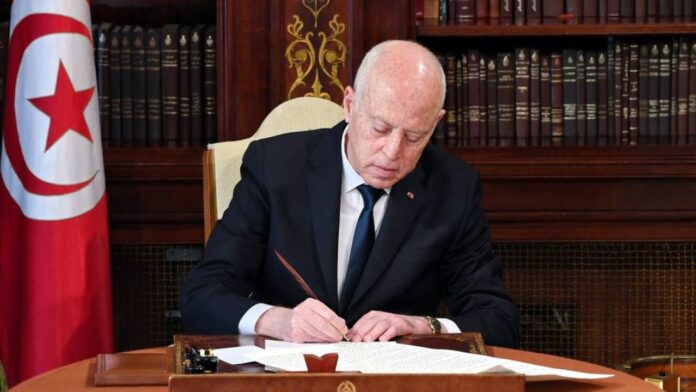June 8, 2021
Today, Wednesday, June 9, 2021, the constitutional deadlines granted to the President of the Republic, Kais Saied, to seal the draft law to amend the Constitutional Court law and authorize its publication in the Official Gazette of the Republic of Tunisia, expire.
The constitution grants the President of the Republic 4 days as a constitutional deadline to seal bills after the first ratification of them, the second ratification in the case it is returned to Parliament, or after receiving a response from the Constitutional Court, and the temporary body for monitoring the constitutionality of bills performs part of its tasks in monitoring the constitutionality of bills.
It is worth noting that the temporary authority to monitor the constitutionality of bills decided on Wednesday, June 2, to return the draft law to the President of the Republic, so that Kais Saied received an official letter containing its decision on the appeal on June 3, so that the four-day deadline stipulated in Article 81 of the Constitution begins on 04 June, and thus the constitutional deadline ends tomorrow, Wednesday, June 09.
And it was decided to return the draft law to the President of the Republic, due to the lack of the required majority within the commission to take a decision in this regard, according to a statement by Haider bin Amor, the commission’s secretary general.
Three Revisions to the Bill
In its final form, the draft law amending the Constitutional Court Act included three revisions. The first is “the possibility of going down by the majority required to elect one-third of the members of the Constitutional Court by Parliament, in the event of the failure of the first session, from two-thirds to three-fifths. The second revision is also related to members elected by Parliament, but in the candidacy stage, and it is required to replace the nomination mechanism by the blocs, with direct individual nominations for those who meet the conditions. As for the third revision, it is to abolish the “sequence” condition and thus enable the Supreme Judicial Council and the President of the Republic to appoint the rest of the members without waiting for Parliament to succeed in electing the first third,” according to an article published by the Legal Agenda website.
What does the Temporary Body for Supervising the Constitutionality of Bills say?
The law of the Temporary Authority to Monitor the Constitutionality of Bills stipulates that the commission considers the constitutionality of bills based on a request from the president of the republic, the head of government, or at least thirty deputies, which is submitted to it within a maximum period of seven days from the date of the council’s approval of the challenged bill or the contested bill and that the appeals are submitted by a petition filed with the secretariat of the Commission.
What about Chapter 81 of the Constitution?
Article 81 states that the President of the Republic seals the Bills and authorizes their publication in the Official Gazette of the Republic of Tunisia within a deadline not exceeding four days from the date of the Council’s second ratification without amending a draft law according to his response, and he did not challenge it as unconstitutionality after the first ratification, or a decision on its constitutionality was issued, or it was obligatory for the President of the Republic in accordance with the provisions of the third paragraph of Article 121.
(Paragraph 5) Issuance of the decision of the Constitutional Court or the obligatory referral of the draft law to the President of the Republic in accordance with the provisions of the third paragraph of Article 121, if it was previously rejected by the President of the Republic and approved by the Council in an amended form.
Establishment of the Constitutional Court: What are the Possible Hypotheses?
In front of the give and take between Parliament and the President of the Republic, Professor of Constitutional Law Abdel Razzaq Al-Mokhtar explained, in a statement to “JDD Tunisie”, on Thursday, June 3, 2021, that “the law has no more than two options related to either having it sealed by the President of the Republic, Kais Saied, or to reject signing it after it is returned by Temporary Body for Supervising the Constitutionality of Bills.”
Al-Mokhtar also suggested that Saied would refrain from sealing the draft law, given the letter he sent to the Assembly of the Representatives of the People, in which he hinted at his position, and that he is the party that responded.
What about the main reason for the absence of the Constitutional Court to this day? Professor of constitutional law, Rabeh Khraifi, believes that the reason is political par excellence, as there is no serious will on the part of the government coalition and successive governments, basically, because they are the beneficiaries of the chaos and the interpretation of the constitution in the absence of the entity authorized to read and interpret the constitution.











